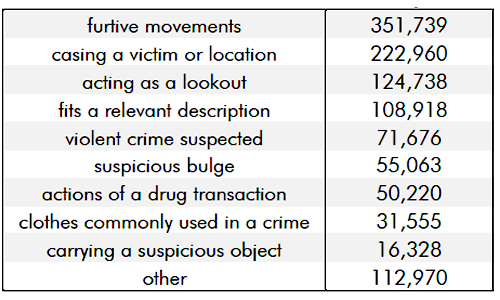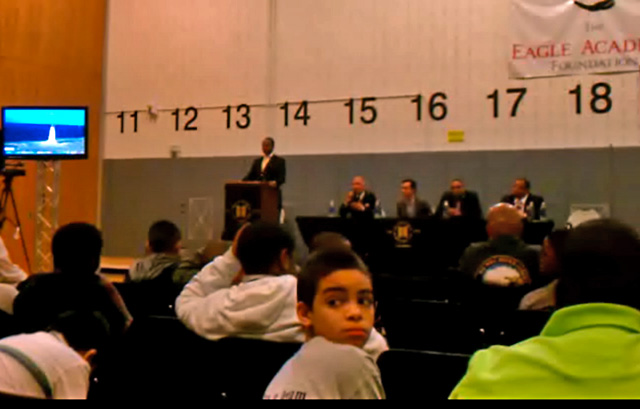By Hector Felix
The Bronx Journal Staff Writer
The case of Trayvon Martin has African American and Latino parents wondering how to help their kids navigate a world where they may experience discrimination or racial profiling.
Stop and frisk, a practice where police detain and search subjects, has many in the community incensed because of the disproportionate numbers of minorities affected. In 2011, police stopped and searched 685,724 people. Of these, 53 percent were black and 34 percent were Latino, and 9 percent were white, according to the New York Civil Liberties Union.
Opponents of the policy got a boost on May 9th when NYC Public Advocate Bill de Blasio launched a campaign to reform stop and frisk, saying it was “broken” and encouraging Mayor Michael Bloomberg to help fix it.
In a release from his office, de Blasio said, “We cannot wait until the mayor leaves office to change this broken policy. Stop and frisk is a valid police tool, but it is being misused thousands of times each day. Every unwarranted stop widens the gap between police and the communities they protect—making us all less safe.”
De Blasio also unveiled bloombergactnow.com, a site where he details his plan to reform stop and frisk. Among them are holding police accountable for bad stops, halting cuts for funding after-school programs and strengthening officer-community relations.
Bronx Borough President Ruben Diaz Jr. echoed the sentiment in the release, saying “I myself have been stopped-and-frisked by police officers for no reason, both in my youth and during my time serving in the New York State Assembly. I know firsthand just how arbitrary and unfair this policy is. It is time for this practice to be reformed.”
Police say stop and frisk is an important tool to keep the streets clean of crime and drugs. The NYPD says it recovered 819 guns from people searched in 2011. De Blasio counters that the policy is being overused, with “roughly one stop every 46 seconds” in 2011.
Mayor Michael Bloomberg responded to the public advocate’s plan on the weekly radio show, “Live from City Hall,” defending the effectiveness of the stop and frisk policy in reducing crime. “The number of guns that we’ve been finding has continued to go down, which says the program at this scale is doing a great job,” said Bloomberg. The point of the policy, he said, is not to catch people with guns but to prevent them from carrying them.
Bloomberg compared stop and frisk to DUI checkpoints. “It’s like a stop we have for driving while intoxicated. It would be great if everybody said, ‘Oh my goodness, I might get stopped so I’m not gonna drink and drive.’ That’s what we want. The fact that we’re getting fewer guns says the program is working.”
Police Commissioner Raymond Kelly defended stop and frisk during a City Council hearing in March, crediting it, in part, for the dramatic decrease in the murder rate. He also said that “people of color” are 96 percent of shooting victims and he challenged members to suggest an alternative to the practice. “We do stop and question people,” said Kelly. “But what I haven’t heard is any solution to the violence problem in these communities.”
One Hundred Black Men Inc., an advocacy organization, sponsored a community forum on the subject of stop and frisk in April at the Eagle Academy in East Tremont. Among the community leaders present were Lieutenant Jose Torres of the NYPD, Pastor Larry Davidson of the Resurrection Celebration Center in Queens, political scientist Wilmer J. Leon and Rutgers professor in criminal justice Andres Rengifo.

Host Jacques DeGraff, Lieutenant Jose Torres, Professor Andres Rengifo, political activist Wilmer Leon
Panelists had words of advice for residents eager to avoid run-ins with the authorities. “What should you do if stopped by the police?” asked one young man in the audience.
The police want the community to listen and be courteous, said Lieutenant Jose Torres. “What is it that you want to happen when the police stop you?” asked Torres.
“To get done with the questioning as fast as possible to get back home,” said the youth.
“Remain calm,” said Leon.
Lieutenant Torres agreed. “The calmer you are, the faster you can be on your way home,” he said.
Attitude, or even the perception of attitude, can be important, said the panelists. Many minority youths see police as the enemy, they said, which causes them to act aggressively or to refuse comply with instructions. Other tips include carrying ID, keeping your hands where police can see them, not reaching into your pockets, exercising your right to remain silent and getting badge numbers or a full name of the officers involved.
One audience member, Renee, related her personal story of being stopped, frisked and arrested. The charges were later dropped, she said. She felt it was difficult to report abuse by the police. Rengifo, on his part, said that there is information available on the NYPD site, which has links to where you can file a complaint.
As students, teachers and parents listened to the words of the pastor, many erupted into applause. “This is the time for the beginning of this dialogue,” said Pastor Davidson. “When we see a robbery, we say ‘I hope the person who committed the crime isn’t black,'” said Davidson. People want to be seen as individuals, and not a group for stereotyping, he said.
The same could be said about the police, said Davidson. All police officers don’t behave the same way, said Davidson. They want to be judged on their individual merits and behavior, just as we do, he said.
One problem is that many people don’t report misbehavior by the police, said Leon. Call the precinct, write a letter, he said.
“Get your story out,” said Rengifo, so that there is an investigation.
State Senator Gustavo Rivera added his support for de Blasio’s call for reform on his site. “I regularly speak to young black and Latino men who live and work in the Bronx about stop and frisk and the way it makes them feel about the local police,” said Rivera. “That is why we have to address the practice of stop and frisk head-on, recognizing that it does not make our communities safer and it ultimately makes the jobs of law enforcement officials harder because of the mistrust it engenders.”
Bryant Estevez, a 22-year-old Bronx native, relates a story of how he was once in a cab, on his way from school, when police suddenly stopped the taxi. They asked him to get out, searched him and his book bag, and then questioned him. “They said I looked suspicious,” he said. “I feel as if they just wanted to f— with me.”
This is the reaction of many minorities to what they say feels like an arbitrary abuse of power. Eighty-eight percent of those stopped and searched, aren’t arrested or given a summons.
Angel Rivas, a 23-year-old barber who lives and works in the Bronx, has a similar story to Estevez. As he was taking a 15-minute break in front of the barbershop where he works, he was approached by two police officers and asked to move. “I told them I was on a break from my job, they didn’t respect that,” he says. “And they continued to tell me to move.” When Rivas made his way back into the barbershop, the officers went in behind him, arrested him, searched him and took him in.
NYPD statistics for January through March 2012 indicate that there have been 203,500 stops, about 20,000 more than in 2011. However, the NYPD points out that the murder rate is lower as well.
As candidates gear up for the 2013 mayoral elections, stop and frisk is clearly going to stay on the agenda for the months to come.
— With reporting by Jennifer Regalado and Lorraine Acosta







